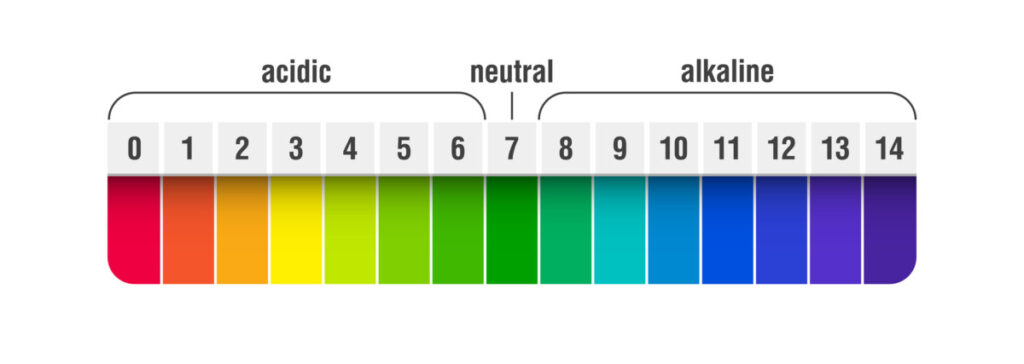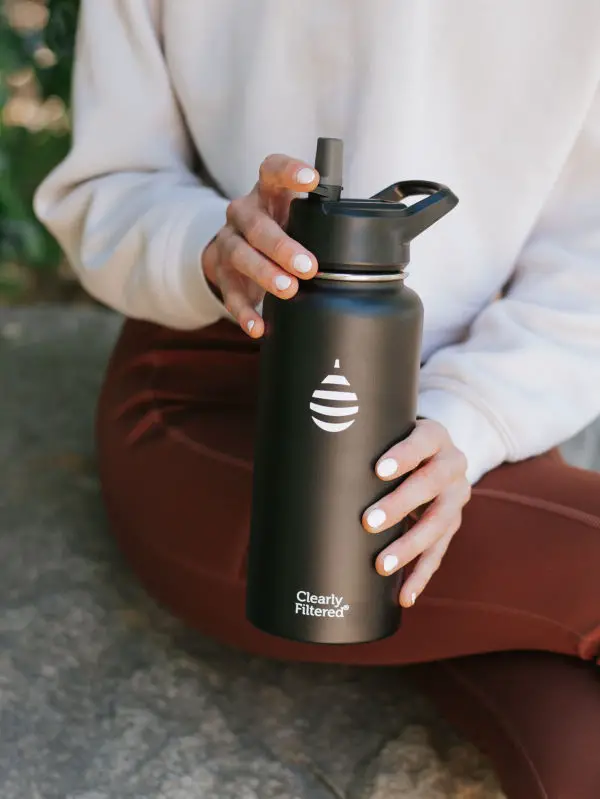Alkaline water (high pH) is good for certain people who need support in maintaining their body’s pH levels. It can also help restore balance after intense exercise, as it often contains minerals such as calcium and magnesium. But for healthy individuals, plain water is better.
Fluids in the human body need to remain just above a neutral pH value of 7 for optimal performance. Water high in pH is also known as alkaline water. It is commercially marketed as a neutralizing solution that supports our body’s balance. But is it really good for you?
This article will explain how alkaline water affects our body, and whether water with high pH is a good addition to your diet or not. We also provide three good examples of bottled water that are either naturally alkaline or have minerals added to increase alkalinity.
- Alkaline water has a pH greater than 8.
- Drinking water high in pH may decrease blood glucose and cholesterol and help prevent osteoporosis.
- Long-term or excessive consumption of alkaline water may cause an imbalance in our gut flora, and irritate our skin, eyes and mucosal membranes.
- Plain water is preferable to alkaline water. The World Health Organization and the U.S. EPA recommend water have a pH between 6.5 and 9.0.
What is alkaline water really?
Water helps our metabolism neutralize acidic and alkaline elements and maintains the slight alkalinity required for our body to function correctly.
In order to understand alkaline water, first we need to talk about pH, which is just an abbreviation for a term called potential of hydrogen (pH).
pH is the concentration of hydrogen ions (positively charged ions) in water.
This concentration is measured on the pH scale from 0 to 14.
- More hydrogen ions lower the water’s pH, making it acidic.
- Less hydrogen ions makes a solution more alkaline (aka more basic).
- In the middle, we have the pH of 7, which is considered neutral.

You may not know this, but the pH scale is logarithmic. This means a change in pH of just one means there was actually a tenfold increase or decrease in its hydrogen ion concentration.
As an example:
- A pH of 8 is ten times (10X) more alkaline than a pH of 7.
- A pH of 9 is one hundred times (100X) more alkaline than a pH of 7.
Effects of alkaline water on the body
A lot of research has investigated the health effects of alkaline water. Unfortunately, the results are contradictory. This means that some studies show alkaline water causes negative health effects, while other studies show it is good for our body.
Let’s take a closer look…
Health Benefits
In 2022, lab tests showed the consumption of alkaline ionized water caused a reduction in:
- Blood glucose
- Cholesterol
- Triglycerides
Other studies also show alkaline water can neutralize acid in the bloodstream. It also seems to help slow bone loss and prevent cardiovascular diseases, as well as cancer.
There have even been reports that drinking alkaline water may prevent osteoporosis and protect pancreatic beta cells with its antioxidant effects.
In particular, alkaline water with a pH between 8.5 and 10 may be beneficial for people with irritable bowel syndrome.
Health Risks
The human body has a natural way of preserving a pH range of approximately 7.35 to 7.45.
The food and water and we consume can leave acidic or alkaline by-products in our body.
Too much alkalinity can agitate the body’s pH and affect our gut flora.
This means that drinking excessive amounts of alkaline water may also produce negative side effects, such as lowering our stomach’s natural acidity. Acidity in the stomach is actually necessary to kill bacteria and prevent pathogens from entering our bloodstream.
At high pH levels (above pH 10), drinking can cause irritation of the skin, eye, and mucous membrane (mucous in internal cavities and on organs). It may also cause gastrointestinal issues and skin irritations in sensitive persons.
Warning
The World Health Organization (WHO) states it is impossible to determine if there is a direct relationship between the pH of drinking water and human health. This is because the pH of water is also closely tied with other aspects of water quality, and that the acids and alkalis in water are usually very dilute and weak.
Importantly, while drinking alkaline water is relatively inexpensive and seems an ‘easy’ remedy for many health conditions, researchers have warned that the promotion of alkaline water to the public for cancer prevention or treatment is NOT justified.
What is the healthiest pH for drinking water?
For Everybody
The WHO determined that the optimum pH of drinking water is within the range of 6.5 to 9.5, similar to the range of 6.5 to 9.0 suggested by the U.S. EPA.
For Athletes
A study on male athletes (~21 years old) who drank high mineral alkaline water at pH 8.8 for 3 days (in amounts of 4.0 liters per day) showed it significantly improved their anaerobic performance. A pH of 8.8 is within the recommended range of the WHO and EPA.
For the Elderly
Alkaline water can help people at an older age who need extra help to support their bone mineralization.
Plus, the body’s regulation of its pH levels relies on the kidneys, and the elimination of excess carbon dioxide via the lungs. As we grow older, the ability of our organs declines, and with reduced renal capacity, the tendency for people to suffer from low-grade acidosis increases.
An alkaline diet and alkaline water can have especially beneficial effects in these cases.
The consumption of alkaline water may also be a risk-free treatment for patients with reflux disease.
Brands of bottled alkaline water
Commercially available water with pH values above 7 is typically marketed as alkaline water, or alkaline ionized water. Bottled alkaline water is regulated by the U.S. Food and Drug Administration, and might also have nutrients (minerals) added to it to achieve a higher pH.
Alkaline water such as Waiakea Hawaiian Water, Icelandic Glacial Water, and Essentia Bottled water have a pH of 8.2 or greater. Waiakea Hawaiian and Icelandic Glacial waters are naturally alkaline – meaning their alkalinity comes from the minerals they already contain (naturally). Essentia Bottled water is ionized alkaline water and boasts a pH of 9.5, which is about as alkaline as you can get for bottled drinking water. Minerals are also added to Essentia water to achieve it’s high pH.
What causes alkalinity or acidity?
- Alkaline minerals (or nutrients), such as potassium, calcium and magnesium. These are positively charged ions (called cations).
- Acid minerals (or nutrients), such as phosphate, sulfate and chloride are negatively charged ions (called anions) and produce acidity.
- Hard water generally means it has a high mineral content, mainly calcium and magnesium. These are alkaline nutrients, which means that when water has a pH above 8.5 it will typically be considered hard thanks to its high mineral content. Hard water also causes aesthetic effects, including an alkali or metallic taste and odor, as well as the formation of scale on dishes and appliances, staining of clothing and sinks, and making soaps and detergents unable to lather.
- Spring or river water typically contains essential alkaline minerals that are picked up naturally from the environment as the water travels through rocks and soil.
- Natural mineral water has a stable composition of minerals. If it is bottled at the source to maintain its original chemical properties, it is usually alkaline.
- Electrolysis can generate alkaline water by separating the acidic and alkaline components of water.
Basicity Vs alkalinity
You’ll often hear the words basicity and alkalinity when talking about pH. However, they do not mean the same thing and are easily confused with each other.
Although they are both related to a high pH value, basicity is used to describe a solution (like water) when it is ‘being alkaline‘, but alkalinity is actually the capacity of the water to resist from becoming acidic.
Alkalinity is determined by its capacity to neutralize (or buffer) against acidity.
Frequently Asked Questions
Is water high in pH good for kidneys?
Water, as in regular H20, is vital for your kidneys health, as it helps them remove waste in the form of urine and open the blood vessels for the transport of nutrients. Alkaline water in particular can help reduce the risk of urinary calculus and the adverse side-effects of hemodialysis in patients with end-stage renal disease.
Can alkaline water cause kidney stones?
The magnesium and calcium in alkaline water are known to be beneficial in reducing the likelihood of certain kidney stones, but there have also been rare cases of alkaline water consumption coinciding with the development of serious kidney stones.
Urine pH levels can influence the formation of kidney stones. While a high pH favors the crystallization of calcium and phosphate-containing stones, a low urinary pH promotes uric acid or cystine stones.
For that reason, most doctors recommend drinking plain water as the safest way to keep the kidneys healthy.
Can alkaline water constipate you?
Alkaline water does not cause constipation. In fact, it is associated with positive effects on abdominal symptoms, including pyrosis, dysphoria, distension of the abdominal region, chronic diarrhea, and even constipation.
Neutralizing the acids in the stomach is essential for maintaining the intestinal flora in optimal conditions. The best way to break down food and help your body absorb nutrients is to drink plain water, with a pH value within the range of 6.5 and 9. This water also helps soften stool and avoid constipation.
Should you drink alkaline water?
For most people plain regular water combined with a balanced, nutrient rich diet is the best way to stay hydrated and healthy. A variety of vegetables, fruits, nuts, seeds and spices are natural ways to help a healthy adult maintain the proper alkalinity of their body fluids and neutralize acids effectively.
The Best Water Filter Bottle We’ve Ever Used
Clearly Filtered | Stainless Steel Filter Bottles
We really love these filter bottles for keeping your drinks cool and contaminant free! They remove 99.9% of over 220 contaminants and use BPA-free plastics and double-walled stainless steel to produce some awesome looking designs with numerous bottle sizes for every situation. You can find them at Clearlyfiltered.com

